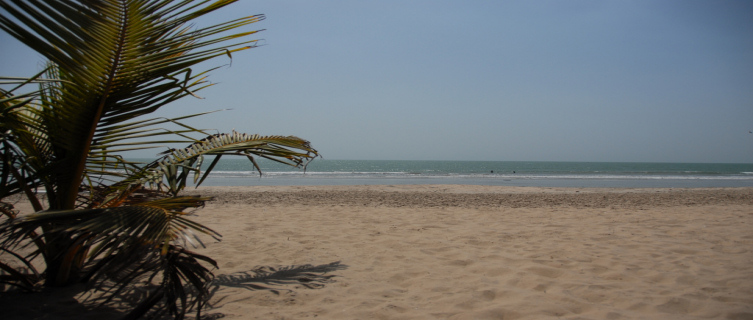
The impressive Sanyang Beach in Banjul is the perfect place to relax and let the day pass you by
© Creative Commons / aleutia
Banjul
The Gambian capital is a low-key city with a distinctively tropical flavour. Situated right at the mouth of the River Gambia, it was settled by the 19th century colonial British; from this strategic base they controlled the lucrative river trade. Today, the everyday activity around Banjul's intercontinental port is as frenetic as ever, and the city market is always abuzz with stallholders and browsers haggling over fruit, fish and textiles. The evenings, by contrast, are subdued: many workers depart for the suburbs at dusk and a closed-for-business hush soon follows.
The best beach for relaxing is the man-made strand at the Atlantic Hotel (Marina Parade); it's quiet as most hotel residents prefer the relative seclusion of the pool. The city's other beaches are places of work, used by fishermen, boat-builders and river-ferry operators - they're absorbing to explore.
Banjul's most prominent attraction is Arch 22, the less-then-attractive monument that looms over Independence Drive. Commissioned by President Jammeh, it commemorates the 1994 coup which brought his government to power. Its top floor balconies offer an unrivalled view of the city. The National Museum, also on Independence Drive, is small, dusty and dated but among the jumble of exhibits are some interesting cultural artifacts such as musical instruments and ritual objects. The mangrove creeks on the edge of town are excellent for fishing and birdwatching.
Gambians are extremely welcoming to kids and the larger hotels offer basic childcare facilities. The city itself makes no concessions to visiting families, but youngsters with a sense of adventure will be fascinated by the exotic-looking produce on sale in the market.
The popular beaches at Cape Point, Kotu and Kololi are 15-25 minutes away by road: here you can chill out on the sand, swim in the Atlantic (when it's not too rough) and sample freshly mixed fruit cocktails. To escape the bustle, head further south to the attractive beaches near Gunjur, Sanyang and Kartong. Alternatively, cross to the north bank of the River Gambia and explore Jinack Island, part of the wild, sparsely inhabited Niumi National Park. The heritage destinations of James Island and Juffureh are a day trip away, as are the prime birdwatching areas of Abuko, the Tanbi Wetlands and the Makasutu Culture Forest.
For an evening to remember, reserve a table at Ngala Lodge (Atlantic Boulevard, Fajara) or Coconut Residence (Kerr Serign, Kololi); each a 15-20 minute taxi ride out of town, they're probably The Gambia's finest restaurants. For a dreamy couple of days, leave the city behind and book into the luxury wilderness accommodation at Mandina Lodge near Brikama or enquire about Sandele (www.sandele.com), the new high-spec eco-lodge near Kartong.
Do you have any Feedback about this page?
© 2026 Columbus Travel Media Ltd. All rights reserved. No part of this site may be reproduced without our written permission, click here for information on Columbus Content Solutions.




 You know where
You know where